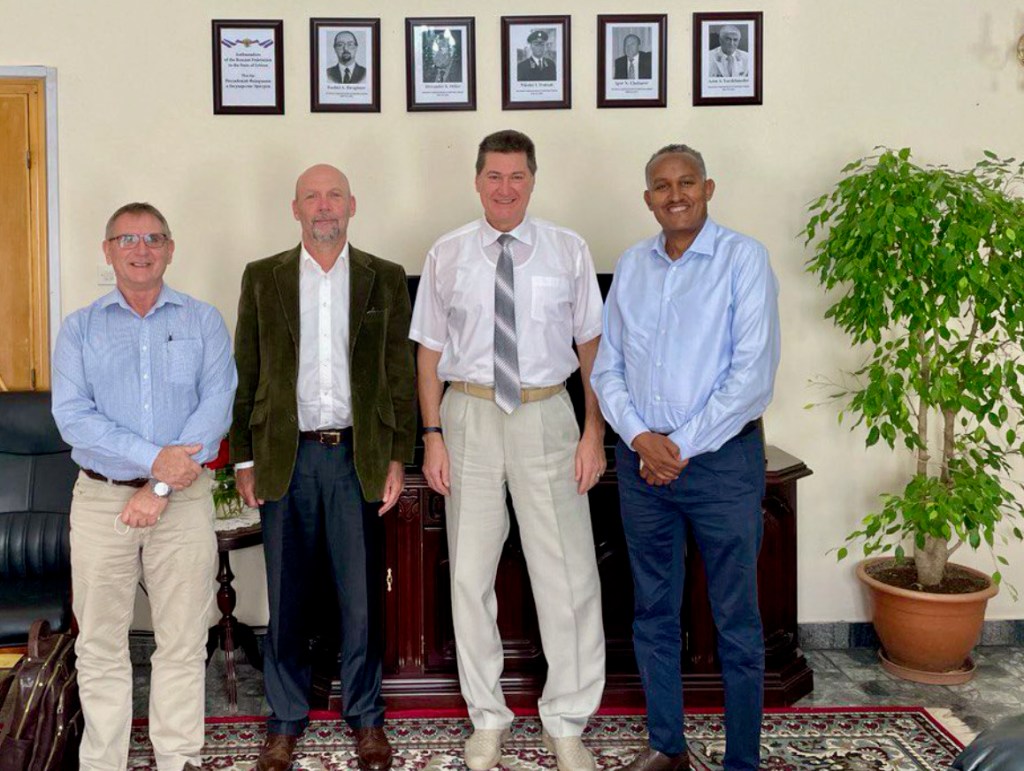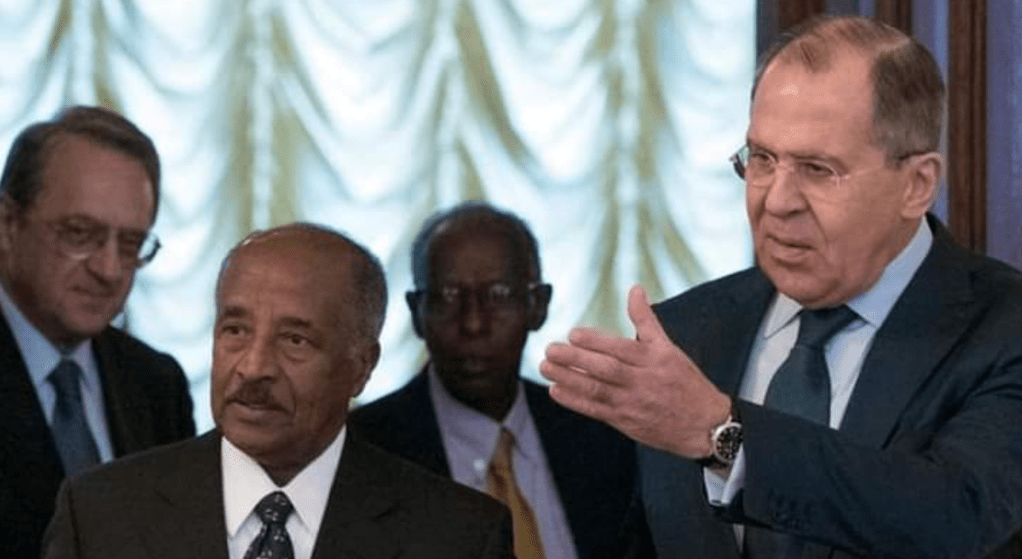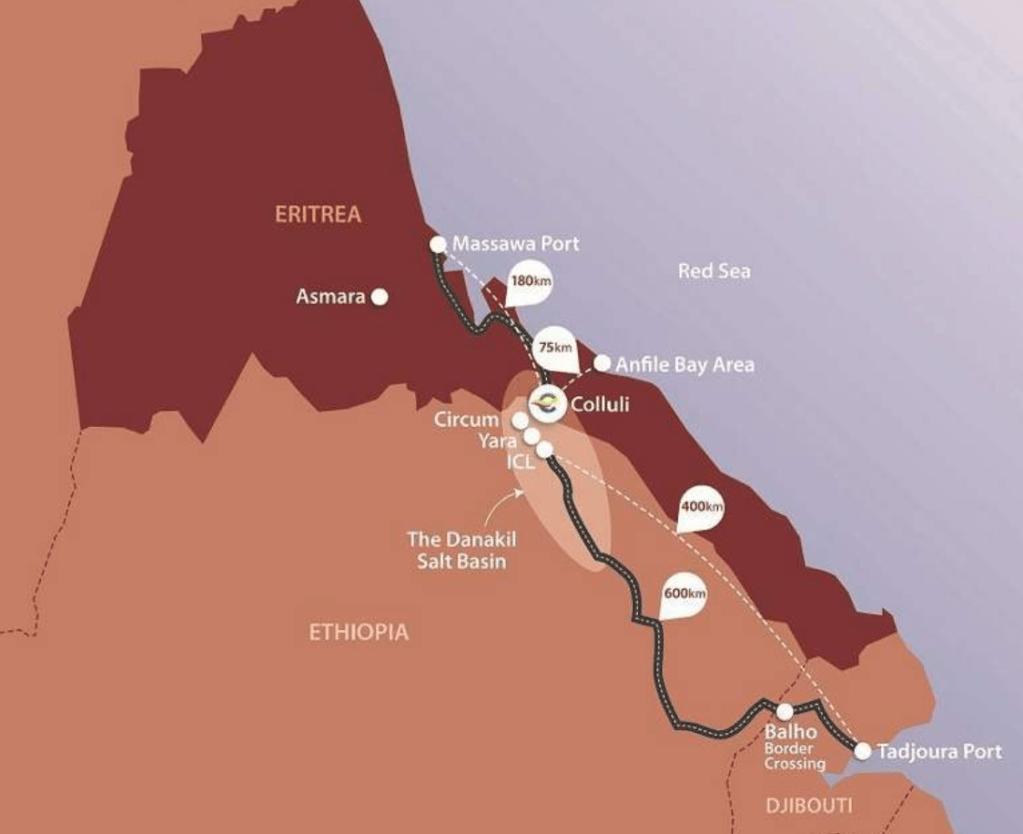Important developments are under way in Eritrea’s relations with Russia.
To take the most recent development first: in a Tweet released today, the Russian Ambassador to Eritrea, Igor N. Mozgo announced that he met with the Chairman of the Australian mining company Danakali Ltd, Mr. S. Kornelius, on 28 April 2022.

An ambassador meets a businessman: nothing extraordinary about this.
But in Eritrea – where next to nothing is officially announced – it is important to see events in context. And the context is this: the meeting comes hard on the heels of a trip to Moscow by Eritrea’s Foreign Minister, Osman Saleh Mohammed with President Isaias’s closest adviser, Yemane Gebreab. There he met his opposite number: Russia’s veteran Foreign Minister, Sergey Lavrov.

Osman Saleh had held discussions with the Russian ambassador just prior to setting off for Moscow.
The Russia – Eritrea relationship
The Economist quoted the noted Eritrean historian, Gaim Kibreab, who provided an insight into the history of this relationship.
The author of a recent book on Soviet-Eritrean relations, he argues that despite this “the EPLF always considered the Soviet Union as a strategic ally against imperialism, and saw America as its number one enemy.” Even after the collapse of the Soviet Union, Isaias Afewerki, the EPLF’s former leader and Eritrea’s dictator since independence, has continued to see himself as part of an axis of anti-Western powers led by Russia.
In recent years the Russians have strengthened this relationship, suggesting that one of Eritrea’s ports would make an ideal base from which to operate in the Red Sea.
“A negotiation process is under way regarding the creation of a logistics center at one of the ports in Eritrea to boost our bilateral trade,” Lavrov was quoted as saying by Interfax in September 2018, after talks with his Eritrean counterpart Osman Saleh in the Russian resort city of Sochi.
Suggestions that this relationship has blossomed was underlined when the Eritrean opposition TV station, Erisat broadcast details of the Eritrean military making a visit to Russia two days ago.
Erisat mentioned that four senior generals had gone to Moscow following the visit by Foreign Minister Osman Saleh and Yemane Gebreab. It is rare for Eritrean generals to be in the news, let alone feature in a televised international visit.
The giant potash deposit
But this relationship is beginning to look like much more than logistics or geo-politics. The Danakil depression in eastern Eritrea contains one of the largest potash deposits in the world.
The exploitation of this vast reserve, which straddles the Eritrea-Ethiopia border, has been under consideration since 2015 as a joint venture with the Eritrean government.
In initial plans, it was suggested that developing the postash could see the construction of a new Eritrea port at Anfile Bay. Subsequently this suggestion was dropped due to the bad substrate that would need stabilizing. The port of Massawa will be the main outlet for the potash.

In July 2020 the semi-official Eritrean website, Tesfanews, announced:
“Danakali has been given the final green light from the Eritrean Ministry of Energy and Mines to develop its world-class Colluli potash project.
Australia’s Danakali is closer to getting its Colluli potash project off the ground after the Eritrean Ministry of Energy & Mines (MoEM) accepted the company’s development plan for the mine.
The endorsement takes the miner another step closer towards building the world-class sulphate of potash (SOP) mine, which has been called “a game-changer” for Eritrea’s economy.”
Enter the Russian oligarch
Developing a project of this magnitude requires very deep pockets and it was hard to see how sufficient money would be raised to finance it.
At this point Russian businessman Andrei Melnichenko, came forward with an agreement to buy the entire output of one of the potash mine. The deal was signed in 2018.
The 2018 statement, from Australian based Dankali Limited, said that Eurochem “will take, pay, market and distribute up to 100% (minimum 87%)” of its sulphate of potash output.
Danakali’s chairman, Seamus Cornelius, described the deal as a “significant milestone because it enables Danakali to achieve the required project funding and significantly de-risks its financial position in relation to its Colluli potash project.”
The Colluli mine is the company’s flagship asset that will produce almost 1 million kilotons of sulphate of potash annually when the project is fully developed over the coming years. Exploration had been under way since 2012.
Eurochem
Eurochem was then owned by Andrei Melnichenko, reportedly Russia’s seventh richest businessmen, with an estimated wealth of over $15 billion.
Melnichenko was reported to own many houses: a villa in Cap D’Antibes named Villa Altair and a US$ 12 million penthouse in New York. And the US$ 40 million Harewood Estate in the UK, along with a string of fancy yachts and planes to fly him between these assets.
But the war in Ukraine has put pressure on Russia oligarchs who have come under increasing sanctions from the West.
In March 2022 Eurochem announced that Mr Melnichenko was stepping down.
EuroChem Group AG, a leading global fertilizer producer, announces that Andrey Melnichenko has resigned his position as Non-Executive Director of the Board of Directors, and withdrawn as main beneficiary, effective March 9, 2022.
The move follows Mr. Melnichenko’s inclusion in an EU sanctions list, and was taken to ensure EuroChem is able to continue providing millions of people around the world with nutrients for agriculture, helping to underpin global food security.
It is – of course – difficult to put all these pieces together.
It is clear that the Eritrea-Russia relationship is strengthening both politically and militarily. But it is important not to ignore the economic dimension.
The meeting between Ambassador Mozgo and the Chairman Danakali Ltd, Mr. S. Kornelius, indicated the future development of the potash mine is under discussion between the Danakali company and the Russian government. It’s output will find a guaranteed market through EuroChem, with or without Andrey Melnichenko.
Once the potash mine starts production it will – as the Eritrean government claims – be a “game-changer” for the economy.
The country will have the cash to underwrite its seemingly endless military exploits across the Horn of Africa – of which the war in Tigray is only the latest manifestation.
A Russians base in an Eritrean port could cement the Eritrean-Russian relationship, with the potential to transform the region.
